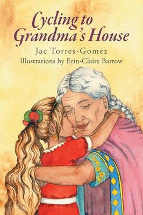Cycling to Grandma's House by Jac Torres-Gomez

Ill. by Erin-Claire Barlow. Lulu Publishing. 2014. ISBN
9781483406374.
Luna has a challenge from her teacher . . . 'Find out the most
incredible characteristic of being a girl or boy. Then present it to
the class on Monday.' But she is flummoxed - what was so special
about her that would connect her to every other girl in her town?
Knowing she could rely on her to solve the problem, Luna asks hers
mother who tells her she does have an idea but 'only the most
courageous girl in our town could do a whole project about it.' Luna
is intrigued, particularly when her mother says she will have to
cycle around town to speak to a lot of women and that it connects
not only them but also girls all around the world. And it is then
the Luna learns about menarche, a girl's first period, and how
different cultures celebrate this critical coming-of-age event.
Luna is excited by the idea and decides to head for her Mexican
grandmother's house to find out more. On her way she meets her
friends from a host of countries and cultures, and when she explains
why she is cycling to Grandma's house, they share their stories of
how menarche is treated and greeted. She learns much in such a short
trip! When Luna presents her project at school on Monday, she is
bombarded with questions, each of which every girl is likely to ask
and Luna realises that cycling to Grandma's has been the discovery
of a lifetime.
With a granddaughter who is likely to reach this milestone in the
next couple of years, I was eager to review a book that addressed an
issue not normally featured in a fictional setting. Yes, there are
many non-fiction resources available that present the physical facts
about menstruation but to find something that addresses the
emotional side and could such a great be a conversation starter
between mother and daughter is rare. Well-written in a format that
straddles the picture book-novel bridge, and beautifully illustrated
with bright, engaging pictures, this is a book that needs to be in
every library. We need to de-mystify this important event and help
our girls to take it as another stride in their journey to
independent adulthood, as well as ensuring our boys are informed so
they are compassionate rather than embarrassed.
The mission of the team behind this book is to 'empower communities
everywhere to understand and address the barriers women face around
menstruation'. This book is certainly a step in that direction.
Barbara Braxton